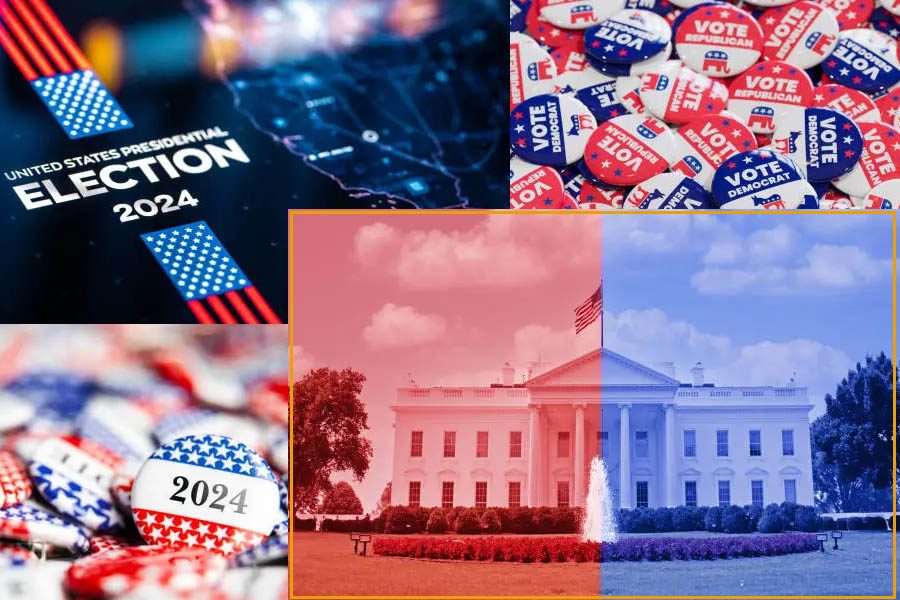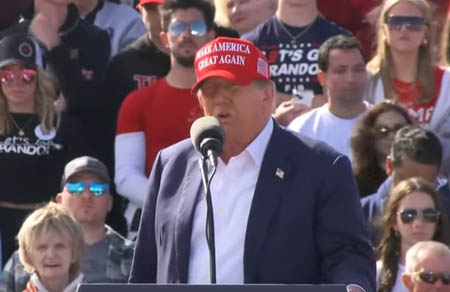
The 2024 U.S. Election: A Battle Between Two Global Visions
5-Oct-2024The 2024 U.S. election is not just about America—it’s about the fate of global politics, power struggles, and the alignment of world leaders. As the race intensifies, the dynamics of foreign policy have come to the forefront, with two starkly different views dominating the international conversation. The decisions made by American voters this November will reverberate far beyond the borders of the United States, with a direct impact on the future of the Middle East, Russia-Ukraine tensions, and the broader global order.
Two Visions: Israel or Ukraine?
There’s a growing narrative, especially in Asian and global political circles, that this election boils down to a choice between two opposing visions. On one hand, we have Donald Trump, the favored candidate for those who support a strong Israeli presence in the Middle East, represented by Israeli Prime Minister Benjamin Netanyahu. On the other hand, there’s Kamala Harris, who represents continuity in American support for Ukraine's fight against Russian aggression and a more diplomatic, democratic approach to international relations.
For many, the 2024 election is less about domestic policies and more about the future of American global influence. It’s about whether America should prioritize its alliance with Israel or uphold its democratic commitment to Ukraine. Let’s explore these two diverging views:
1. Donald Trump and Israel: A Reinforcement of Old Alliances
Trump’s first term solidified his close relationship with Netanyahu, most notably through his decision to move the U.S. embassy to Jerusalem and withdraw from the Iran nuclear deal. For many Israelis, particularly Netanyahu’s government, Trump represents a reliable ally who is willing to take bold, controversial steps that favor Israeli interests. His hardline approach against Iran and unwavering support for Israeli military actions have made him a hero in the eyes of Israel’s right-wing leadership.
Netanyahu, who has delayed peace negotiations in the region, may be waiting for Trump’s return to power in the hopes of strengthening his hand against regional foes like Iran. For Netanyahu, Trump represents the best chance for continued military dominance and aggressive strategies in the Middle East.
For American voters who view Israel as a crucial ally, the decision is clear: a vote for Trump is a vote to keep Israel strong in a volatile Middle East. The implications are not just about military might, but also about maintaining a certain kind of American leadership—one that is unafraid of taking unilateral action.
2. Kamala Harris and Ukraine: Defending Democracy on a Global Scale
On the other side of the coin, we have Vice President Kamala Harris, who represents the current administration’s support for Ukraine and its fight against Russian expansionism. Since the beginning of Russia’s invasion of Ukraine, the Biden-Harris administration has poured billions of dollars into military aid, sanctions, and diplomatic efforts to stop Vladimir Putin's aggression.
While some Republicans, including Trump, have wavered in their support for Ukraine, Harris has stood firm, arguing that the defense of democracy in Ukraine is crucial not only for Europe but for the entire world. In this view, allowing Russia to succeed would set a dangerous precedent, potentially emboldening other authoritarian regimes, like China, to make aggressive moves of their own.
Harris’s vision of the world is one where democracy must be defended at all costs, and that includes standing by Ukraine. For voters who believe that American global leadership is rooted in upholding democratic values, Harris is the clear choice.
The Leaders Eyeing the Election
The importance of the U.S. election isn’t lost on world leaders. Both Netanyahu and Putin have a vested interest in who occupies the White House come January. Netanyahu’s preference for Trump is well-known, while Putin has expressed a surprising degree of favor toward Kamala Harris, possibly seeing in her the potential for more nuanced diplomatic negotiations compared to the unpredictability of Trump.
As American voters prepare to head to the polls, they should be aware that their decision isn’t just about domestic concerns—it’s about the future of the world order. Netanyahu’s close relationship with Trump signals a Middle East policy focused on hard power and unilateral actions. In contrast, Harris’s approach to Ukraine represents a commitment to multilateral diplomacy and the defense of democracy against authoritarian regimes.
Asian Eyes on America
Interestingly, this election is being closely watched by countries across Asia, who see it as a defining moment in global politics. Many Asian analysts view the 2024 election as the final match in a long-running contest of ideologies. The outcome will determine whether the U.S. doubles down on its support for Israel’s dominance in the Middle East or if it shifts its focus to ensuring the survival of democratic states like Ukraine in the face of growing authoritarian threats.
For many Asian countries, the election is also a referendum on the kind of global leadership America will offer. Will it be the America that unapologetically backs its allies in hardline, controversial policies, as seen with Trump and Israel? Or will it be the America that leads through democratic principles and international cooperation, as seen with Harris and Ukraine?
A Global Responsibility
As November approaches, U.S. citizens need to recognize the immense weight of their vote. The future of global politics is in their hands. It’s not just about who leads America, but about the role America plays on the world stage.
Will they choose a path aligned with Israel’s Netanyahu, emphasizing military strength and bold moves in the Middle East? Or will they side with Harris, defending democracy in Ukraine and potentially setting a new tone for global diplomacy?
One thing is certain: this election will shape the future of international relations for years to come. The world is watching closely, with Asia viewing it as the ultimate political showdown. The choice is yours, America. Let’s see who the world’s superpower sides with, come November.
Tags: #USElection2024 #GlobalLeadership #TrumpVsHarris #WorldPolitics #Israel #GlobalPolitics #MiddleEastPolicy #UkraineSupport #AmericanLeadership #WorldDiplomacy #GeopoliticalShift #ElectionImpacts #PoliticalDebate #GlobalPostHeadline
Thank you for reading: Globalpostheadline.com





